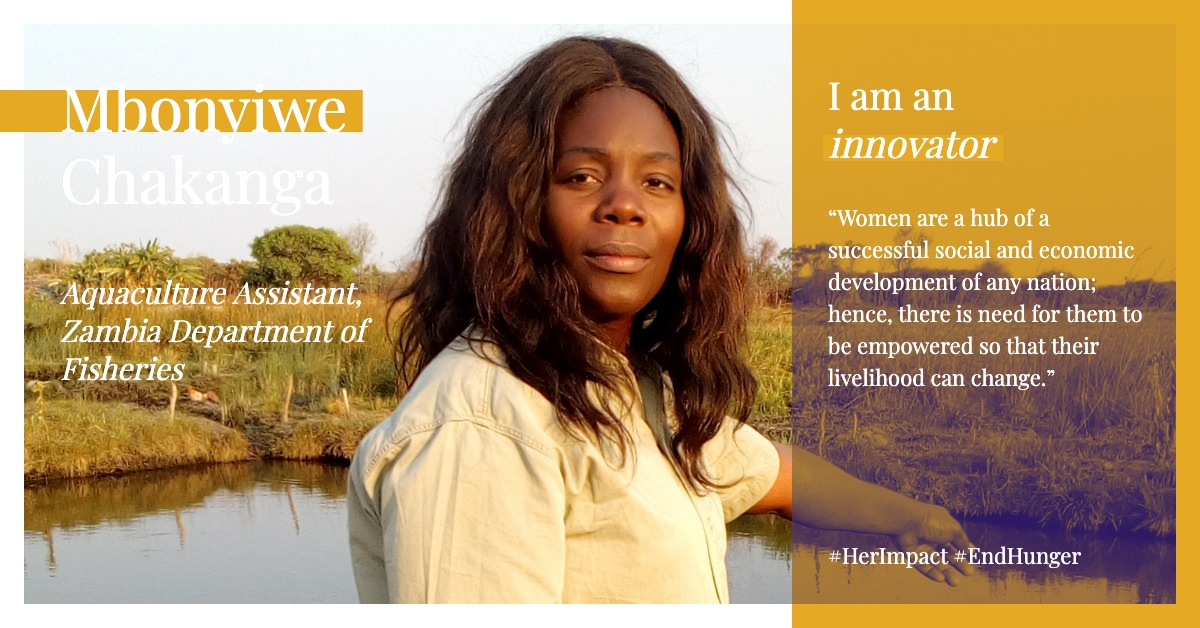
September 19, 2019
Kristen Dechert
Photo courtesy of Mbonyiwe Chakanga
Mbonyiwe Chakanga dreams of a Zambia with improved opportunities for women in aquaculture and increased production for fish farms throughout the country.
“My vision is to see Zambia being the largest exporter of fish and to see women fish farmers shifting from the small-scale level to the intensive commercial level, especially in the northern part of the country as there is a decline in fish stocks in this region,” she said.
Chakanga is an aquaculture assistant in Zambia’s Ministry of Fisheries and Livestock’s Department of Fisheries, where her work focuses on the Samfya district in the Luapula province. In this position, she fills a variety of research and extension roles. She regularly collects and prepares aquacultural materials required for the generation and dissemination of data in order to provide information for aquaculture development
“At my workplace, I collect data to inform the district about the number of fish farms and fish production, hold sensitization meetings on the importance of fish farming, offer technical knowledge and skills to fish farmers, and train farmers on aquaculture pond maintenance,” she said.
Chakanga believes that empowering women to take on more opportunities in the sector can result in improvements in production and aquaculture management throughout her district and the country overall.
“At the moment, there are more men in the fishing industry than women, so production comes from men,” Chakanga said. “But if women are given access, production can be doubled or even more.”
Chakanga noted that not only will production and management improve, but more involvement from women also would improve families’ livelihoods and health.
“Woman having access to fisheries and aquaculture will enable food and nutrition security and income generation, which improves household living,” said Chakanga. “The active participation of women in the fisheries and aquaculture industry can contribute to one of the [United Nations General Assembly’s] Sustainable Development Goals of eradicating hunger and poverty. It further promotes enterprises among women and youths, and through this, dependence on men is reduced and equality is promoted. In the end, poverty can be defeated, and women can become key drivers to development.”
This summer, Chakanga assisted the Feed the Future Innovation Lab for Fish’s Fish4Zambia team with collecting data in several Lake Bangweulu fishing camps. This research team is exploring avenues for improved livelihoods for women and nutrition for young children.
“Fish is a critical protein, and as such, it is needed by pregnant women and lactating mothers,” said Chakanga.
Because women are the main home caretakers, increasing their participation in the fish value chain will increase their own access to fish and provide opportunities for them to feed these important proteins to their children, she added.
“In my experience, women often give priority of the fish caught to be consumed by family members unlike men whose top priority is selling,” said Chakanga. “Hence women have the potential of suppling fish to families, thereby contributing to their family’s nutritional security.”
Chakanga’s work is helping Zambia work toward reducing poverty and ending hunger by enabling women to participate in key economic sectors, such as fishing, agriculture, and livestock farming.
She hopes this works not only helps women to become more engaged in the sector but leads to new job growth in general.
“These sectors will not only involve women, but they require hiring people for labor, therefore creating jobs for other families who need to pay school fees for their children and put food on the table,” said Chakanga. “Women are a hub of a successful social and economic development of any nation; hence, there is need for them to be empowered so that their livelihood can change.”
